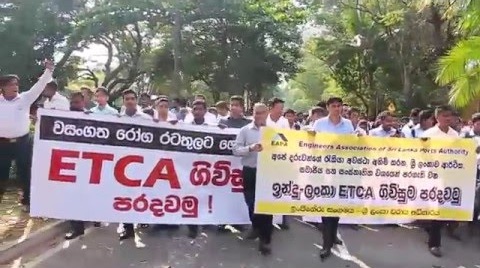- Negotiations

Sri Lanka has preferential and free trade agreements with India, Pakistan, Iran, Egypt, Singapore and Israel. It is currently in the processing of upgrading its agreement with India to a much more comprehensive one.
Sri Lanka is also party to SAFTA, the agreement on a South Asia Free Trade Area, as well as BIMSTEC, which aims to hammer out a regional FTA.
last update: May 2012
Photo: Sri Lankan engineers’ association
1-Sep-2008
Financial Times
This article is written in recognizing the numerous opinions floating around in Sri Lanka in respect of the proposed Comprehensive Economic Partnership Agreement (CEPA) with India. Most of the public discussions and paper articles on CEPA, which we see today, are either based on personal or political sentiments or absolute analysis of numerical figures. The whole purpose of this article is to give a holistic and comparative analysis based on facts and figures explaining the current status of the FTA with India.
6-Aug-2008
Economic Times
Sparks flew in the Sri Lankan parliament as supporters and critics clashed over the proposed Comprehensive Economic Partnership Agreement (CEPA) with India.
5-Aug-2008
The political parties debated the pros and cons of the Comprehensive Economic Partnership Agreement (CEPA) in Parliament yesterday with the JVP and its breakaway group which is now called the National Freedom Front (NFF) asking the government to scrap it.
28-Jul-2008
It would have almost happened. President Rajapaksa and Indian Prime Minister Manmohan Singh were slated to sign the Comprehensive Economic Partnership Agreement (CEPA) between the two countries sometime during the SAARC summit at the beginning of next month. Fortunately wiser counsel prevailed, if one might employ a rather weathered phrase.
28-Jul-2008
Live Mint
An India-Sri Lanka trade and investment agreement billed as a landmark is being delayed, ostensibly because the island nation’s President, Mahinda Rajapaksa, an avowed Sinhala nationalist, doesn’t want to be seen as authoring such a close partnership with New Delhi, diplomats who spoke on condition of anonymity said.
20-Jul-2008
Sunday Times
A group of eminent Sri Lankan businesses went public this week objecting to the signing of the Indo-Lanka Comprehensive Economic Partnership Agreement (CEPA). The local businesses are questioning the need for a CEPA agreement and are objecting to the lack of transparency in the process.
3-Jun-2008
Asian Tribune
The US-Sri Lanka TIFA Council discussed issues affecting US exports, such as Sri Lanka’s agricultural biotechnology policies, import tariffs, intellectual property rights protection, and transparency in government procurement.
4-May-2008
The Sri Lankan government is forging ahead with the Comprehensive Economic Partnership Agreement (CEPA) which will facilitate the entry here of two Indian banks - Bank of Baroda and Axis Bank, according to senior officials at the Central Bank.
19-Mar-2008
The European Union has told Sri Lanka it has "very serious concerns" about civil war human rights abuses and that lucrative trade concessions could be at risk if they continue.
19-Feb-2008
The Island
India’s Minister of Commerce was in Colombo last week. He had the usual few words to say about the benefits that are supposed to have accrued to pretty much everybody since the entry into force of the free trade agreement with Sri Lanka in 2000. Unfortunately, the story isn’t so simple. Taking a closer look at what has happened in practice would prompt even the most ardent believer to question the undoubtedly beguiling theory of free trade.






